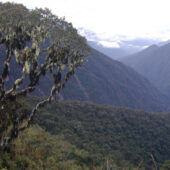U.S. News & World Report ranks Wake Forest among top-30 national universities
 U.S. News and World Report’s 2018 Best Colleges guide ranked Wake Forest University 27th overall among 311 national universities and 12th for its commitment to undergraduate teaching.
U.S. News and World Report’s 2018 Best Colleges guide ranked Wake Forest University 27th overall among 311 national universities and 12th for its commitment to undergraduate teaching.Categories: Awards & Recognition, Enrollment & Financial Aid, Experiential Learning, Research & Discovery, University Announcements

 Hidden in plain sight – that’s how researchers describe their discovery of a new genus of large forest tree commonly found, yet previously scientifically unknown, in the tropical Andes. Researchers from the Smithsonian and Wake Forest University detailed their findings in a study just released the journal PhytoKeys.
Hidden in plain sight – that’s how researchers describe their discovery of a new genus of large forest tree commonly found, yet previously scientifically unknown, in the tropical Andes. Researchers from the Smithsonian and Wake Forest University detailed their findings in a study just released the journal PhytoKeys. Stan Meiburg, a former acting deputy administrator of the Environmental Protection Agency (EPA) who is now Wake Forest University’s director of graduate programs in sustainability, can discuss environmental challenges in the aftermath of Hurricane Harvey.
Stan Meiburg, a former acting deputy administrator of the Environmental Protection Agency (EPA) who is now Wake Forest University’s director of graduate programs in sustainability, can discuss environmental challenges in the aftermath of Hurricane Harvey. The WFU Awards and Recognitions briefs celebrate milestones of faculty, staff and students at Wake Forest.
The WFU Awards and Recognitions briefs celebrate milestones of faculty, staff and students at Wake Forest. The Pro Humanitate Institute at Wake Forest University will host a panel discussion on race, politics and the South called “The Case of Charlottesville: Why Charlottesville Happened and What It Means for the Rest of Us” on Thursday, Sept. 7 at 6 p.m. in Wait Chapel.
The Pro Humanitate Institute at Wake Forest University will host a panel discussion on race, politics and the South called “The Case of Charlottesville: Why Charlottesville Happened and What It Means for the Rest of Us” on Thursday, Sept. 7 at 6 p.m. in Wait Chapel. Tonight, following the first day of classes, Wake Forest University students, faculty and staff will gather for a candlelight vigil to acknowledge and reflect on the recent violence in Charlottesville, Va.
Tonight, following the first day of classes, Wake Forest University students, faculty and staff will gather for a candlelight vigil to acknowledge and reflect on the recent violence in Charlottesville, Va. Within the next century, rising ocean temperatures around the Galápagos Islands are expected to make the water too warm for a key prey species, sardines, to tolerate. A new study by Wake Forest University biologists, published in PLOS One Aug. 23, uses decades of data on the diet and breeding of a tropical seabird, the Nazca booby, to understand how the future absence of sardines may affect the booby population.
Within the next century, rising ocean temperatures around the Galápagos Islands are expected to make the water too warm for a key prey species, sardines, to tolerate. A new study by Wake Forest University biologists, published in PLOS One Aug. 23, uses decades of data on the diet and breeding of a tropical seabird, the Nazca booby, to understand how the future absence of sardines may affect the booby population. Like any aspiring engineer, first-year student Meredith Vaughn gets excited about building something from the ground up, so Wake Forest University’s new undergraduate engineering program immediately appealed to her.
Like any aspiring engineer, first-year student Meredith Vaughn gets excited about building something from the ground up, so Wake Forest University’s new undergraduate engineering program immediately appealed to her. Wake Forest University professor of anthropology Ellen Miller is working with an international team of researchers who discovered a 13-million-year-old fossil ape skull in Kenya that sheds light on ape ancestry.
Wake Forest University professor of anthropology Ellen Miller is working with an international team of researchers who discovered a 13-million-year-old fossil ape skull in Kenya that sheds light on ape ancestry. More than 1,350 first-year students will move into Wake Forest residence halls on Wednesday, Aug. 23. This class was admitted from an applicant pool of more than 13,000. Seventy-seven percent of the class of 2021 were in the top 10 percent of their high school classes.
More than 1,350 first-year students will move into Wake Forest residence halls on Wednesday, Aug. 23. This class was admitted from an applicant pool of more than 13,000. Seventy-seven percent of the class of 2021 were in the top 10 percent of their high school classes.